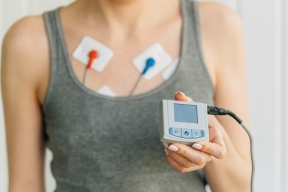Atrial Fibrillation: Causes, Diagnosis & Treatment
From an interview with
Dr. Cyrus Kocherla
McLeod Cardiology Associates – Florence
AFib or atrial fibrillation is an irregular heart rhythm of the top chamber of the heart. It’s a pretty common problem, and many patients here in the Pee Dee suffer from it. It can be associated with a rapid heartbeat, but most times it’s just an irregular heartbeat, and it can cause a variety of problems.
Some of the risk factors for atrial fibrillation are age, as older people are at greater risk of developing this problem. Heart disease is a risk factor; in fact, this includes anyone with valve problems, congestive heart failure, or coronary artery disease. Anyone who’s had a history of heart attack or heart surgery has an increased risk of atrial fibrillation, as well as patients with high blood pressure or thyroid disease. Other chronic health conditions such as diabetes, kidney disease, lung disease or sleep apnea also increase the risk of atrial fibrillation. Obesity is a problem, because patients who are at a higher weight than they should be are at risk, as well as those who drink alcohol or have a family history of AFib.
You can have AFib and not know it. Some patients get used to the way their body feels, so they’re unsure if they’re in AFib. They may not be aware until their physician gets that patient back to a normal heart rhythm, and they’re surprised at how much better they feel.
AFib is diagnosed in a variety of ways. It can be diagnosed just by simply detecting an abnormal irregular heart rhythm on a physical exam visit. It could be diagnosed from an E K G using monitors. Now, even most Apple watches, smart watches and portable home E K G monitoring systems can diagnose AFib.
The treatment options of AFib really center around preventing stroke. So to prevent a stroke, your doctor may start you on a blood thinner. On the other hand, there are a variety of treatment options to keep people in normal rhythm and to help them feel better. Some include shocking your heart into a normal rhythm and taking medications. Still, others require a surgical treatment called an AFib ablation, which we specialize in here at McLeod. This helps keep your heart in a normal rhythm. In some advanced cases, your physician may insert a pacemaker and perform a complex ablation, after which you are pacemaker-dependent.
To learn more, speak with a cardiologist near you.
-
McLEOD REGIONAL MEDICAL CENTER FLORENCE
843-777-2000 -
McLEOD DARLINGTON
843-777-1100 -
McLEOD DILLON
843-774-4111 -
McLEOD LORIS
843-716-7000 -
McLEOD SEACOAST
843-390-8100 -
McLEOD CHERAW
843-537-7881 -
McLEOD CLARENDON
803-433-3000



-
McLEOD REGIONAL MEDICAL CENTER FLORENCE
843-777-2000 -
McLEOD DARLINGTON
843-777-1100 -
McLEOD DILLON
843-774-4111 -
McLEOD LORIS
843-716-7000 -
McLEOD SEACOAST
843-390-8100 -
McLEOD CHERAW
843-537-7881 -
McLEOD CLARENDON
803-433-3000
 Find a Doctor
Find a Doctor  Locations
Locations  Services
Services 